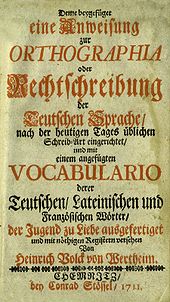orthography


The orthography (also orthography ; from Latin orthographia , ancient Greek ὀρθός orthós "upright", "correct" and -graphy ) or spelling is the generally accepted spelling of the words of a language in the script used . Any spelling that differs from this is generally referred to as a spelling error.
Alphabet spelling
There are two fundamentally different approaches to spelling in alphabet fonts:
- the phonemic spelling (flat orthography), which strives for the simplest possible relationship between the sequence of sounds and the typeface ("write as you speak"), whereby in the ideal case "a" grapheme corresponds exactly to "one" phoneme ( spelling with 1: 1 correspondence ) , and
- the morphophonemic spelling (deep orthography), the grammatical and also often linguistic-historical ( etymological ) derivation relationships between different words and in particular between the conjugated , compared or declined forms of a word become visible.
The phonemic approach usually refers to only one standard variety of the language in question. In this sense, the orthography of Bulgarian , Finnish , Georgian , Italian , Serbian , Spanish and Turkish is predominantly phonemic . The spelling of Spanish, for example, is more phonemic for Castilian Spanish than, for example, for Argentine or Cuban (which, of course, do not understand each other as subordinate dialects, but rather as high-level Argentine or Cuban language).
What is particularly striking is the strongly etymological morphophonemic spelling of English . In English, a sequence of letters (e.g. ough ) can have four or more different pronunciations; conversely, a certain sound sequence can have many different spellings, depending on which word it occurs in, e.g. B. According to the [ ʃ ] ( unvoiced fricative postalveolar , "sh") as o c fi ean, sh , ac ti on, s acid, etc..
Even the French writes decided etymologically. If France put its orthography on a purely phonemic basis, the family resemblance of French to the other Romance languages would hardly be recognizable. In French, a sound can have numerous different spellings (e.g. the grapheme sequences au , aud , auds , ault , aulx , aut , auts , aux , eau , eaud , eaux , haut , hauts , ho , o , ô , od , ods , oh , os , ot , ots ).
The spelling of German has both phonemic and morphophonemic elements (not shown hardening of the final voices , e / ä spelling, etc.), but with relatively few etymological spellings (an exception are many newer foreign words and some homophones ). Especially with loans from English spelling is rarely to the German phonetic picture adjusted ( biscuit , strike , but not (grain) Fleks , Kompjuter , march Mello u. Ä.). However, were with the spelling reform of 1996 some Eindeutschungen in this area introduced (z. B. ketchup , wallet ,) but have not done consistently (eg. As boutique with e for Boutique [Butik], spelling with h for orthography [ɔʁtoɡʁafiː ]), were not consistently continued and some were canceled again (e.g. ketchup ).
See also
- Capitalization
- punctuation
- Lower case
- Point rules
- Phonetic spelling
- Spell check (for word processing programs)
literature
- Helmut Glück (Ed.): Metzler Lexicon Language . 4th edition. Verlag J. B. Metzler, Stuttgart and Weimar 2010. ISBN 3-476-02335-4 .
- Michael Schlaefer: Basic features of the German history of orthography from 1800 to 1870. In: Linguistics . Volume 5, No. 3, 1980.
- Michael Schlaefer: the way to the German standard orthography from the year 1870 to the year 1901. In: Sprachwissenschaft. Volume 6, No. 4, 1981.
- Günther Thomé: German orthography: historical, systematic, didactic. 2., improve. Edition. isb-Fachverlag, Oldenburg 2019. ISBN 978-3-942122245 .
Web links
Individual evidence
- ↑ Orthography, orthography, the. Duden online, accessed on August 8, 2012 : "Latin orthographia <Greek orthographía, to: gráphein = to write" .